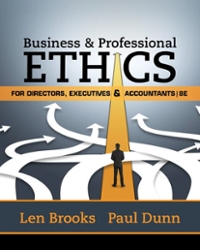During the depths of the subprime lending crisis in 2008, a major U.S. investment banking firm, Goldman
Question:
During the depths of the subprime lending crisis in 2008, a major U.S. investment banking firm, Goldman Sachs, required a
\($10\) billion bailout from the U.S. government’s Troubled Asset Relief Program
(TARP) to stay afloat. But in 2009, Goldman’s fortunes reversed as the firm earned
\($13.4\) billion profit, repaid the \($10\) billion to TARP, and paid its employees over \($16\) billion.1 The firm’s nickname, “Golden Socks,”
appears to be well earned. But is this spectacular reversal just too good to be true—
or at least the result of unethical, if not illegal, practices? Did Goldman profit unfairly by somehow taking advantage of unsuspecting clients or by undermining a floundering U.S. or even world economy?
In fact, serious allegations have been raised about Goldman’s role in the financial crisis, including the following:
1. Duping American International Group, Inc. (AIG) into insuring poorquality mortgage securities and then
a. triggering insurance payments to Goldman by setting artificially low securities valuations, thereby
b. precipitating a \($130\) billion–plus bailout of AIG and a transfer of 79.9% equity ownership to the U.S. Federal Reserve Bank and
c. causing the U.S. government to pay
\($52.5\) million to Goldman in settlement of credit default swaps in which AIG had insured mortgage securities.2 2. Betting against clients by taking “short positions on collateralized debt obligations
[CDOs] that it had created and sold to clients.”3 3. Stuffing “these CDOs with inferior mortgage assets that ensured their collapse.”.........
Questions:-
1. Based on the conflicts of interest raised in the case, has Goldman Sachs, in effect, shorted itself? Explain why and why not.
2. How should Goldman Sachs have handled each conflict of interest?
3. If Goldman Sachs really is innocent of all conflicts, why has the firm’s reputation suffered?
4. Referring to the outrage over the apparent abuse of AIG, Farzad and Dwyer ask the question, “If the firm could just write a multibillion-dollar check to erase the outrage—deserved or not—over the AIG payout and be done with the public agony, wouldn’t it just do it?”30 What would your answer be? Provide your reasoning for and against.
5. Is it appropriate for Goldman Sachs to “bet against their clients” through their investment activities?
6. One of Goldman’s main arguments in their defense is that their intentions were good—they did what they did in response to client requests, thus facilitating markets and making the world a better place.
a. Is the “good intention” argument sufficient to claim actions following from it are ethical? Why and why not? Remember the saying, “The road to hell is paved with good intentions.”
b. Is there something in addition to good intentions that Goldman Sachs would have been wise to consider in its decision making?
7. How would you have advised Goldman Sachs’s executives to have handled this crisis better?
8. What would an appropriate level of bonus payments be for Goldman Sachs as a whole?
9. Would bonuses paid in Goldman Sachs stock be more appropriate than those paid in cash?
Step by Step Answer:

Business And Professional Ethics
ISBN: 9781337514460
8th Edition
Authors: Leonard J Brooks, Paul Dunn





